- Home
- Andrew McGregor
Bloody Stalingrad Page 7
Bloody Stalingrad Read online
Page 7
Udet crouched in front of him, briefly checking his wounds before producing his bayonet from underneath his overcoat to cut his bonds. As the terrified captive’s hands dropped when freed, his vision became clouded again, then as darkness overcame him as he passed out.
Chapter Six: Kristallnacht
They had been trudging through the iced landscape for some time now. The methodical and deliberate steps initially breaking the frozen surface of the snow when they had commenced their journey…but in the preceding hour they had been able to make better progress. Their weight was now held by the iced surface as the temperature had dropped further, solidifying the snow beneath the surface.
Hausser had led the men diagonally across to the north east. His aim to reach the banks of Lake Sarpa, considering that this would perhaps limit their exposure to an enemy that would be unlikely to be near the ice at night and only inland. There would also be perhaps the added bonus of lake mist to assist them in the earlier hours of the morning. The initial trek to the lake should have taken about an hour, but in reality the task took 3 hours. Caution was high and the thoughts of the grim reality they now faced etched deeply on their minds promoted frequent stops to check the way ahead. Slowly over this time, the caution and trepidation had transformed into a grim determination to continue against the odds as the temperature dropped further. The men had begun to realise the lack of Russian presence in open country and that the intense cold was assisting their cause. The temperature had dropped further to a bitter level upon approach to the frozen water’s edge, but all were aware that nature’s cold embrace would deter any enemy from the area. With this providing further assurance, they were now progressing slowly northwards along the western banks of the lake.
Wary that the landscape, cold and monotony of the men’s progress would dull senses and limit alertness, Hausser insisted the soldiers answer individual questions regarding their service and surroundings. He had explained his reasoning to the men as they left the cover of the copse of trees, that this was a tactic adopted during the previous winter when they observed slow reactions from patrols and sentries.
Hase had watched Hausser explain this slowly as they had started their walk through the snow, methodically stating the reasoning and ensuring each soldier understood the importance of alertness. That individually they should resist the temptation to become mentally numbed to the cold, surroundings and repetitive walk. That succumbing to these feelings would reduce their effectiveness and reaction time, and that this would spread through the group making them vulnerable to any events that may occur.
As he observed, Hausser explain this to the men he realised the care the officer had for them, for their individual survival. The emphasis the young commander had placed on each soldier understanding what was needed of them individually, requiring them to acknowledge they wanted to survive. That this commitment was essential to demonstrated his determination for them to progress through this danger, to a perceived safety beyond. The commander had held his gloved hand on several of their shoulders as he explained and Udet had received a knock on his helmet in an attempt at humour when he had been slow to respond.
The fear in Udet had been evident in his eyes and Hausser had explained to the young soldier that this was simply a fear of the unknown, that reassurance would come once they had progressed further. Udet had nodded solemnly and the others had listened intently, the breathing of the group seeming to be hushed as Hausser had spoken, as if each man understood the meaning applied to him also.
These actions seemed to slowly transform the low spirits of the group as they progressed, the responses becoming more projected, less withdrawn as they moved. Hase admired this attention to detail in his commander and the resulting effect. This endeared him to the man further and he began to realise that a new loyalty and feeling of belonging was beginning to emerge from his doubt and uncertainty. He realised he was seen as part of the team, a member of the unit, something he had not considered before…a feeling that comforted him, deep in his chest.
The snow sparkled in the moonlight and from the bright stars as they had advanced through the cold, the crackling of ice and crunching of compacting snow beneath their boots as their individual weight was applied. Occasionally a man would slip or stumble as the iced surface of the snow gave way, or they overcame a rut in the earth beneath the enveloped landscape. As time passed this happened less and less frequently as the snow froze through…the temperature was dropping further.
Each man’s overcoat slowly began to gain a thin layer of frozen condensation covering it as the temperature fell, the darkened fabric gradually turning a peppered white. Their bodies became unable to sustain warmth to more than the first layer of clothing, the felt clothing provided by the Romanian quartermaster providing a welcome insulator. The frost extended to their metal helmets, as the last remaining moisture crystallising in the air.
The frost also restricted breathing, freezing the moisture in the scarves across each man’s mouth, turning each exhale into a rasp as the warmth battled against the external temperatures. Each inhale of breath was wheezed as the men’s bodies struggled against the cold temperatures. Their condensed exhaled breath now hung in the air as they progressed, the cold now seeming to still all life and existence.
The night sky was breath-taking in this temperature, the stars seeming to be sharper and brighter than at any time the men had witnessed before. The air was so still and crisp in the low temperature that vision was completely unimpeded, the darkness seeming overwhelming were it not for the sharpness and focus of the lights that pierced through the oblivion of space.
Each soldier now had a felt balaclava which insulated his face, covering their nose and mouth, with the scarf added for extra protection against the elements. This welcome Romanian addition covered their neck and tucked into their uniform, adding to the straw packed into their helmets to retain warmth.
But the cold swept into their eyes, turning them bloodshot as their bodies resisted the fierce temperature, each individual forced to blink more frequently to prevent the moisture in their eyes solidifying. Occasionally, they would each have to brush the frozen condensation from their eyebrows and scarf to assist vision and breathing further.
Hase had listened to the men talk and answer Hausser’s questions as they walked. The soldiers had spoken individually of their personal situations, their words forcibly pushed through the half frozen scarf and felt masking their mouths and noses. The strain of talking whilst walking in these temperatures was initially hard and misunderstood, but then slowly collective realisation became apparent as the numbing and piercing cold dulled their minds when they did not converse. Hausser would break the conversations and predictability by demanding the men look at particular objects, then jump from the expected recipient of a question to an individual that had not spoken for a while.
Hausser had initially targeted Tatu, knowing this would guide the group’s train of thought and exploit their fondness for him. Tatu had obliged, understanding this reasoning and knowing the objective, then quickly asked Hausser a question in return to establish a routine in the men’s minds.
Hase had listened as Hausser and Tatu had exchanged information, then watched and listened to the other four men talk.
Tatu had informed the men that he had signed up for the army with Petru as an adventure, that the Russians had threatened Romania and taken her beloved territory as a ‘bully’ next door would do. That this was the motivation for them joining and that they would help ensure Romania’s future in a new Europe. He spoke with pride as he talked of Romanian history and the future his country must have to sustain its part and the existence of its people. His mood lightened and became gentler when he spoke of Petru and his family. That they were so welcoming to him, he felt as a member of the family, regularly being invited for meals, drinks and to play and assist with the children. That this was what he was fighting for.
Tatu’s determination and passion seemed to energise the group
a little, providing extra motivation and understanding for the others.
Meino had spoken next, advising the soldiers he was the son of an innkeeper from Sinj. He was from Croatia and a member of the 369th Infantry Regiment. He had volunteered for the unit when Germany had asked for soldiers and his country had been wary of Italian expansion. He had left his young wife and father to run the Inn whilst he fought for his country and believed that his suffering would bring a better future. That if he volunteered he would save others from being selected to fight.
Nicu had volunteered to speak next, his determination to involve himself apparent. He spoke in a low emotionless voice, his eyes fixed on the terrain to his front. His occasional, even startled glance at Hausser and Tatu interrupted his stare, a sign he was keen for acceptance, even reassurance after the loss of virtually all his comrades. He explained he was originally from Hotin on the Polish border and had seen the desperation of his country on the loss of Bessarabia to the Russians. That his relatives in Odessa had come to stay with them upon the Russian invasion and he had learnt from his uncle of the cruelty that had occurred in the southern city. His father had wanted him to work in the market with him, but that when the Germans and Romanians had retaken the historical city he had joined up to help defeat the Russians and end any threat to Romania once and for all.
Tatu had patted Nicu on the shoulder in encouragement when he finished, the younger man clearly struggling to complete his contribution, the emotions stirring within him creating a lump in his throat and distorting his voice, youthfully dismissed as the cold.
Hase watched as Hausser spoke to the group. Explaining he had joined up as his father had been in the army before him and that he had been around soldiers all his life. He had been born in Dusseldorf, but had moved to Potsdam at the age of 14 where he had originally joined the 76th Infantry Division. His mother was Romanian and he had learnt the language from an early age, this had provided the opportunity for him to be transferred to units serving in southern Russia. After a spell before Moscow, he had fought in the Crimea with the 11th Army and had then been transferred back to the 76th as the 11th Army was transferred north towards Leningrad. Upon the movement into Stalingrad, he had been transferred to the southern front once again as a result of his language knowledge. He had concluded that it was ironic he was now in Russia as this was where his father had fought during the previous war.
Hausser encouraged Petru to talk, and the ‘older man’ of the group as the officer fondly called him, began by describing his family and children back in his beloved Bucharest. He described the first time he had met Tatu at the furniture makers they had worked at for 6 years before the war. The group had grinned at some of the antics that he had described they had accomplished in the workshops behind the furniture store. He continued, explaining that over time they had begun to invite Tatu more and more to the house he shared with his parents and that soon they felt his friend was part of the family, that his children called him uncle.
Petru continued and started to talk about the lavish meals his wife would prepare when Udet interrupted him abruptly, stating that he was in no mood to listen to talk of food in this situation and that he had been hungry all day. This drew coughs and splutters from the soldiers as they chuckled in the extreme temperatures, the condensed air clouding around them as all of them exhaled.
Meino slapped the young soldier’s shoulder and demanded he explained himself for interrupting his elder. Udet grinned sheepishly beneath his scarf, realising it was now his turn to talk. He described his love of Falkensee, the town he had been born in. It lay near Potsdam and was very beautiful with parks and its close location to the Havel River and waterways. He explained that as a young teenager he had been fortunate that the Olympics had occurred so near his home and that his parents had taken him to see the many parades and ceremonies that had occurred at that time. He continued, stating all should visit his home when the war was concluded, and that his mother was a wonderful host. Observing his father was always able to source extra rations to provide a splendid party, much to the surprise of his brother and him.
Udet had fallen silent in mid-sentence as he glanced something in the distance, the light from the moon illuminating the distortions in the snow at the foot of the slope they had come upon. The other soldiers following his gaze as he slowly pointed.
As they had begun to approach the frozen lake, the temperature had gradually dropped even further, the close proximity to the large expanse of water chilling the air. A light breeze enveloped them as they negotiated a slope and passed through some bushes in their approach to the water, some 50 metres away. The breeze enveloped each man like a cold wave as they descended the decline, seeming to pull them forward, embracing them, their eyes strained to make out the images before them. The freezing air seemed to now cling to their bodies, attempting to seep through every seam, every opening, in their thickly layered clothing.
It was then they came across several bodies in the frozen snow. The retreating Romanian soldiers had been ambushed in the open in broad daylight by a Russian patrol, their attempts to surrender ignored as the initially concealed Russians had opened fire with machine guns. The seven Romanians, having fled the initial breakthrough in haste, had only rifles which offered little defence. They had survived undiscovered as the initial advance waves had passed by, but with limited food and warm clothing, they tried to move north in an attempt to locate a friendly unit. The route was predictable and they were encouraged to see a small number of tracks in the snow crossing the many Russian tracks heading east to west. They had considered that these tracks were potential allied soldiers that had preceded them, men that they would perhaps meet further north. They had followed these tracks.
Despite the tracks, their movement had still been restricted by the deep snow and they had offered virtually stationary targets to the Russians waiting for them in nearby bushes. The Russian penal soldiers, realising their foe offered little resistance, had opened fire and most targets had received several wounds. The Russian patrol had then proceeded to loot the helpless men of any personal belongings as they lay, begging for help. Any individuals that attempted to resist were shot, the Russians jeering at their victims as they pleaded for mercy, their weakened body temperatures already dropping in the cold. Their mission accomplished, the victors had departed leaving the surviving wounded to their obvious fate in the snow. The moans and frustrated weeping of the wounded Romanians granting them chilling satisfaction as the Russians slowly walked away. Heading north to their predetermined rest point for the night, they had walked amongst a number of similar scenes, of further images of butchery. The bodies of the dead they had ambushed earlier, bodies of the survivors that had preceded this group.
Hase observed that their group was crossing the tracks that were in the snow heading north, not joining or following this route. The men were spaced protectively across the area and passed through the grouping of corpses in the snow, their steps deliberate and cautious as to not to tread on the fallen, their eyes scrutinising and scanning the surroundings for any threat.
The contortions of death on the bodies’ faces frozen in these temperatures instilled in the men the certainty of death in these surroundings if they were discovered. A morbid curiosity or simply horror at what could occur imprinting snapped visions of frozen curled fingers, of men reaching for life from a cold embrace of death as they succumbed to their wounds. Unable to rise, their fate sealed as the snow and wind sucked the warmth from their bodies.
Hase had become quite shaken by one corpse that seemed to stare through him as he passed. He could just make out that the eyes were open as he approached in the gloom. The life in the eyes extinguished, but still seeming to stare directly at him. The temperature had frozen the man’s eyes some hours earlier, but they still seemed to be pleading, to be begging for assistance. His mouth open, his last struggles for breath as blood filled his lungs, the escaping liquid frozen to his cheeks. The darkness in the snow indicated
the man had sustained several wounds and that he had been shot at close range at least once. From his expression he may have been pleading for his life, for mercy…and this was what he sensed now, observing the corpse’s last expression. It would be a gruesome vision in his memory that would stay with him for some time to come.
Hausser distracted the men from their thoughts, wary the scene had broken their progress. He determined to keep them moving, to prevent them from losing body temperature if they stopped. Moving to the brow of the final slope before the lake’s edge, he turned to beckon the hesitating soldiers. ‘Come on. There is nothing we can do here. Once we are at the lake’s edge we will make better progress. Keep alert.’
The men responded as Hausser indicated for them to continue, ushering them forward with his outstretched gloved right hand. They passed him individually, grim determination in their bloodshot eyes. Tatu had pushed Petru forward from the scene initially and was the last to pass Hausser, glancing over his shoulder at his dead countrymen as they departed the scene, the officer’s gloved hand comfortingly placed on Tatu’s shoulder.
Hase waited for them at the banks of the lake, Meino and the two younger soldiers some feet away to the north. The two Romanians and Hausser approached slowly, stepping cautiously down the frozen bank, their boots unable to break the surface of the snow for leverage. Hausser placed his right hand on Hase’s shoulder to guide himself down the last few feet of the steeper part of the slope, then turned to assist his two Romanian comrades. Once they were all at the same level, Hausser indicated for the men to close in around him with his gloved hands.

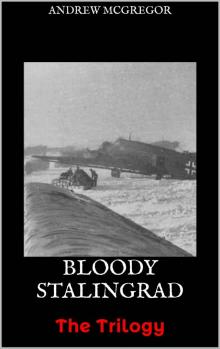 Bloody Stalingrad
Bloody Stalingrad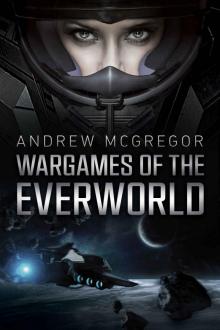 Wargames of the Everworld
Wargames of the Everworld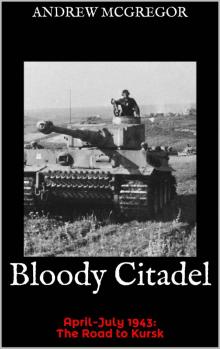 Bloody Citadel
Bloody Citadel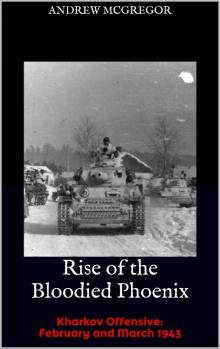 Rise of the Bloodied Phoenix
Rise of the Bloodied Phoenix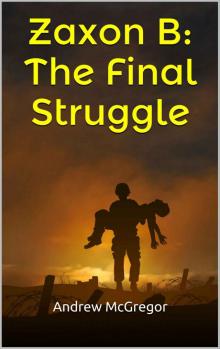 Zaxon B: The Final Struggle (Galaxies Collide Book 4)
Zaxon B: The Final Struggle (Galaxies Collide Book 4)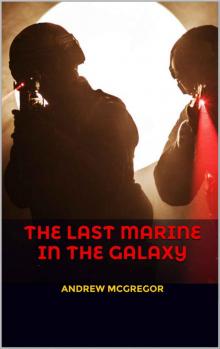 The Last Marine in the Galaxy (Galaxies Collide Book 1)
The Last Marine in the Galaxy (Galaxies Collide Book 1)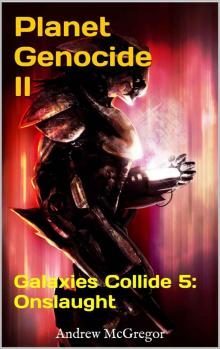 Planet Genocide II: Galaxies Collide 5: Onslaught
Planet Genocide II: Galaxies Collide 5: Onslaught